朱自清 《匆匆》的翻译对比
_匆匆_三种译文之比较_李丹
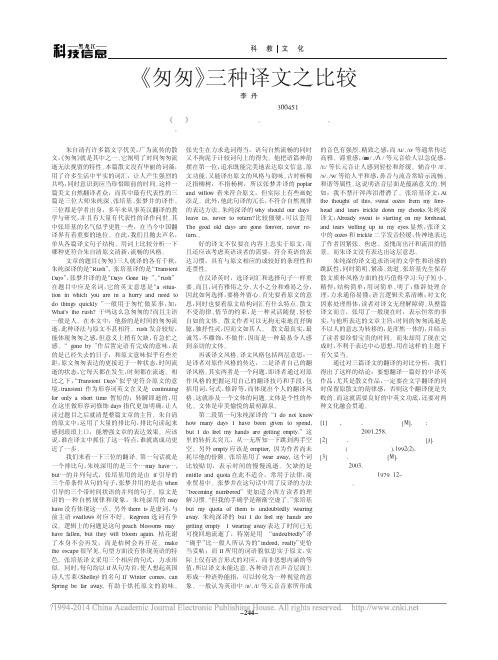
What's the rush? 干吗这么急匆匆的?而且主语 不受韵律、情节的约束,是一种灵活随便、轻松 译文而言,张用了一般现在时,表示恒常的事
一般是人。在本文中,他指的是时间的匆匆流 自如的文体。散文作者可以无拘无束地直抒胸 实,与他所表达的文章主旨:时间的匆匆流逝是
逝,此种译法与原文不甚相符。rush 发音较短, 臆,独抒性灵,因而文如其人。 散文最真实,最 不以人的意志为转移的,是浑然一体的,并暗示
共鸣,同时意识到应当珍惜眼前的时间。这样一 泛指柳树,不指杨树,所以张梦井译的 poplar 和谐等属性。这说明语音层面是蕴涵意义的。例
篇美文自然翻译者众,而其中最有代表性的三 and willow 看来符合原文,但实际上有些画蛇 如:我不禁汗涔涔泪潸潸了。张培基译文:At
篇是三位大师朱纯深、张培基、张梦井的译作。 添足。此外,他此句译的冗长,不符合自然规律 the thought of this, sweat oozes from my fore-
感到琅琅上口,能增强文章的表达效果。应该 but I do feel my hands are getting empty.”这 语教育出版社,2001.258.
说,谁在译文中抓住了这一特点,谁就离成功更 里的转折太突兀,从一无所知一下跳到两手空 [2]王正仁.简谈刘炳善的散文翻译风格[J].山西
近了一步。
距,原文匆匆表达的更接近于一种状态,时间流 是译者对原作风格的传达,二是译者自己的翻
通过对三篇译文的翻译的对比分析,我们
逝的状态,它每天都在发生,时刻都在流逝。相 译风格。其实两者是一个问题,即译者通过对原 得出了这样的结论:要想翻译一篇好的中译英
比之下,“Transient Days”似乎更符合原文的意 作风格的把握运用自己的翻译技巧和手段,包 作品,尤其是散文作品,一定要在文字翻译的同
《匆匆》三种译文之比较
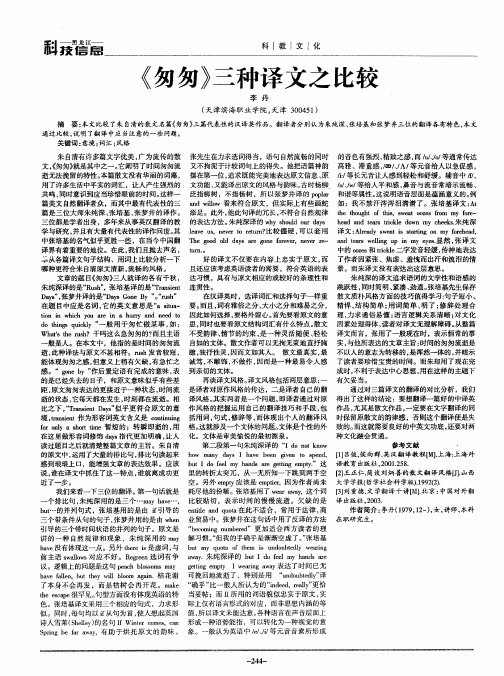
作 品, 尤其是散文作品 , 一定要在文字翻译 的同 时保 留原散文的韵律感 , 否则这个 翻 为流传的散 张先生在力求选词得 当,语句 自然流畅的同时 的音色有强烈、 广 精致 之感 , / 、 / 而 u / 等通 常传达 /o , , AI a I 文 ,匆匆》 《 就是其 中之一 。 阐明了时间匆匆流 又不拘泥于计较词句上 的得失 。他把语篇神韵 高雅 、滞重感 , e、 等元音给人以急促感 , 它 逝无法挽留的特性 。 本篇散文没有华丽 的词藻 , 摆在第一位 , 追求既能完美地表达原文信息、 原 / 等长元音让人感 到轻松 和舒缓 。辅音中 、 i : / 用了许 多生活 中平实的词汇 ,让 人产生强烈的 文功能、 又能译 出原文 的风格与韵味。 古时杨柳 / 、 / s / 等给人平和感 , 与流音常暗示流畅、 /w 鼻音 ol a 这说明语音层 面是蕴涵意义的。 例 共鸣 , 同时意识到应当珍惜眼前 的时间。 这样一 泛指柳树 ,不指杨树 ,所 以张梦井译的 pp r 和谐等属性 。 篇美文 自 翻译者众 ,而其 中最有 代表 性的三 ad wlw 看来符合原文 , 然 n i l o 但实 际上有些 画蛇 如 :我不禁汗 涔涔泪潸 潸了 。张培基译文 : t A h t o g t f t i .s a o e 0 m e o 他此句译的冗长 , 不符合 自然规律 t e h u h o h s we t o z s l my f r - 篇是三位大师朱纯深 、 张培基 、 梦井的译作 。 添足。此外 , 张 三位都是学者 出身 ,多年来从事英 汉翻译 的教 的表达方法 。 朱纯深译 的 w yso l 01d y ha n er tc o n my cek. 纯 深 h h ud 1 as 1 " ed a d t s r Ue dw he s a i 朱 学与研究 , 并且有大量有代表性 的译作 问世 。 其 l v S nvrt r un 比较僵 硬 , 以套用 译 文 : l d w a s s rn n myfrha , e e U, ee o e r? a t 可 Ar y s eti t t g o oeed a e ai e o d l d y o e oe e ̄n vr e n e sw ln p i r 中张培基 的名气似乎更胜一些 ,在 当今 中国翻 Th go od a s ae g n frv r e e r- a d t r eig u n my ee. 然 , a l ys 显 张译文 译界有着重要的地 位。在此 , 我们且抛去声名 , r .o um 中的 oZ 和 tcl 二字发音轻缓 , 地表达 E S rk i e 传神 从各篇译文句子结构 、用词上 比较分析一下 好 的译 文不 仅要在 内容上 忠实于原文 , 而 了作者 因紧张 、焦虑、羞愧而 出汗和流 泪的情 哪种更符合朱 自清原文清新 , 畅的风格 。 流 且还应该考虑英语读者 的需要 ,符合英语 的表 景 。而朱译文没有表达出这层 意思 。 文章 的题 目《 匆匆》 三人就译 的各有千秋 , 达 习惯 ,具有与原文相应 的或较好的条理性和 朱纯深的译文追求语 词的文学性和语感 的
朱自清 匆匆 英译
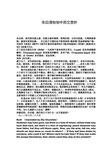
朱自清匆匆中英文赏析朱自清,现代著名散文家,其散文素朴缜密、清隽沉郁,以语言洗炼,文笔清丽著称,极富有真情实感。
并且他宁可饿死也不领美国的“救济粮”的故事家喻户晓。
代表作《匆匆》《歌声》《浆声灯影里的秦淮河》《温州的踪迹》《背影》《航船的文明》《荷塘月色》。
以下是朱自清先生的《匆匆》一文的两个版本的英文译文,《rush》是朱纯深教授翻译,《Transient Days》张培基老师翻译,各有千秋,《Transient Days》更加准确,而《rush》更有韵味,更加传神。
匆匆(朱自清)燕子去了,有再来的时候;杨柳枯了,有再青的时候;桃花谢了,有再开的时候。
但是,聪明的,你告诉我,我们的日子为什么一去不复返呢?——是有人偷了他们吧:那是谁?又藏在何处呢?是他们自己逃走了吧:现在又到了哪里呢?我不知道他们给了我多少日子;但我的手确乎是渐渐空虚了。
在默默里算着,八千多日子已经从我手中溜去;像针尖上一滴水滴在大海里,我的日子滴在时间的流里,没有声音,也没有影子。
我不禁汗涔涔而泪潸潸了。
去的尽管去了,来的尽管来着;去来的中间,又怎样地匆匆呢?早上我起来的时候,小屋里射进两三方斜斜的太阳。
太阳他有脚啊,轻轻悄悄地挪移了;我也茫茫然跟着旋转。
于是——洗手的时候,日子从水盆里过去;吃饭的时候,日子从饭碗里过去;默默时,便从凝然的双眼前过去。
我觉察他去的匆匆了,伸出手遮挽时,他又从遮挽着的手边过去,天黑时,我躺在床上,他便伶伶俐俐地从我身上跨过,从我脚边飞去了。
等我睁开眼和太阳再见,这算又溜走了一日。
我掩着面叹息。
但是新来的日子的影儿又开始在叹息里闪过了。
在逃去如飞的日子里,在千门万户的世界里的我能做些什么呢?只有徘徊罢了,只有匆匆罢了;在八千多日的匆匆里,除徘徊外,又剩些什么呢?过去的日子如轻烟,被微风吹散了,如薄雾,被初阳蒸融了;我留着些什么痕迹呢?我何曾留着像游丝样的痕迹呢?我赤裸裸来到这世界,转眼间也将赤裸裸的回去罢?但不能平的,为什么偏要白白走这一遭啊?你聪明的,告诉我,我们的日子为什么一去不复返呢?一九二二年三月二十八日Rush (translated by Zhu Chunshen)Swallows may have gone, but there is a time of return; willow trees may have died back, but there is a time of regreening; peach blossoms may have fallen, but they will bloom again. Now, you the wise, tell me, why should our days leave us, never to return? — If they had been stolen by someone, who could it be? Where could he hide then? If they had made the escape themselves, then where could they stay at the moment?I do not know how many days I have been given to spend, but I do feel my hands are getting empty. Taking stock silently, I find that more than eight thousand days has already slid away from me. Like a drop of water from the point of a needle disappearing into the ocean, my days are dripping into the stream of time, soundless, traceless. Already sweat is starting on my forehead, and tears welling up in my eyes.Those that have gone have gone for good, those to come keep coming; yet in between, how swift is the shift, in such a rush? When I get up in the morning, the slanting sun marks its presence in my small room in two or three oblongs. The sun has feet, look, he is treading on, lightly and furtively; and I am caught, blankly, in his revolution. Thus —the day flows away through the sink when I wash my hands, wears off in the bowl when I eat my meal, passes away before my day-dreaming gaze as I reflect in silence. I can feel his haste now, so I reach out my hands to hold him back, but he keeps flowing past my withholding hands. In the evening, as I lie in bed, he strides over my body, glides past my feet, in his agile way. The moment I open my eyes and meet the sun again, one whole day has gone. I bury my face in my hands and heave a sigh. But the new day begins to flash past in the sigh.What can I do, in this bustling world, with my days flying in their escape? Nothing but to hesitate, to rush. What have I been doing in that eight-thousand-day rush, apart from hesitating? Those bygone days have been dispersed as smoke by a light wind, or evaporated as mist by the morning sun. What traces have I left behind me? Have I ever left behind any gossamer traces at all? I have come to this world, stark-naked; am I to go back, in a blink, in the same stark-nakedness? It is not fair though: why should I have made such a trip for nothing!You the wise, tell me, why should our days leave us, never to return?28 March, 1922Transient Days (translated by Zhang Peiji)If swallows go away, they will come back again. If willows wither, they will turn green again. If peach blossoms fade, they will flower again. But, tell me, you the wise, why should our days go by never to return? Perhaps they have been stolen by someone. But who could it be and where could he hide them? Perhaps they have just run away by themselves. But where could they be at the present moment?I don't know how many days I am entitled to altogether, but my quota of them is undoubtedly wearing away. Counting up silently, I find that more than 8,000 days have already slipped away through my fingers. Like a drop of water falling off a needle point into the ocean, my days are quietly dripping into the stream of time without leaving a trace. At the thought of this, sweat oozes from my forehead and tears trickle down my cheeks.What is gone is gone, what is to come keeps coming. How swift is thetransition in between! When I get up in the morning, the slanting sun casts two or three squarish patches of light into my small room. The sun has feet too, edging away softly and stealthily. And, without knowing it, I am already caught in its revolution .Thus the day flows away through the sink when I wash my hands; vanishes in the rice bowl when I have my meal; passes away quietly before the fixed gaze of my eyes when I am lost in reverie. Aware of its fleeting presence, I reach out for it only to find it brushing past my out-stretched hands. In the evening, when I lie on my bed, it nimbly strides over my body and flits past my feet. By the time when I open my eyes to meet the sun again, another day is already gone. I heave a sign, my head buried in my hands. But, in the midst of my sighs, a new day is flashing past.Living in this world with its fleeting days and teeming millions, what can I do but waver and wander and live a transient life? What have I been doing during the 8,000 fleeting days except wavering and wandering? The bygone days, like wisps of smoke, have been dispersed by gentle winds, and, like thin mists, have been evaporated by the rising sun. What traces have I left behind? No, nothing, not even gossamer-like traces. I have come to this world stark naked, and in the twinkling of an eye, I am to go to back as stark naked as ever. However, I am taking it very much to heart: why should I be made to pass through this world for nothing at all?O you the wise, would you tell me please: why should our days go by never to return?朱纯深,香港城市大学中文、翻译及语言学系博士,非常有名的翻译家,翻译过朱自清的《荷塘月色》和《匆匆》。
《匆匆》译本比较与评析

匆匆》译本比较与评析朱自清先生是现代著名散文家、诗人、学者,这篇《匆匆》写于1922 年,正值“五四”落潮时期,现实不断给作者以打击,但是作者虽彷徨但仍不失对生活的热切盼望,流露出对生命、对青春的无比珍视,对有限人生的意义和价值的追求。
文章共五段,有一种淡淡的哀伤色彩,颇像一首小的散文诗,兼具散文和诗的特点,语言充满节奏感,内容饱富诗意。
作者多用排比句式,形式工整,句式灵活,语言极富感染力。
运用大量生动的比喻,文采飞扬。
文章结构精巧,层次清晰,首尾呼应。
那朴素隽永的抒情气息,加上淳朴简练的文字,读来真是一种享受。
翻译一篇这样的文学作品绝非易事,但通读三篇译文,我认为各有特色,都较为准确地再现了原文的伤感惋惜的感情色彩。
因张培基先生的两篇译文变动并不大,他的译文2 只是在原译文基础上略加修改,因此分析报告把他的译文2 作为研究对象。
现就朱纯深和张培基的译文进行比较,对其各自的语言特色加以分析。
对比一:燕子去了,有再来的时候;杨柳枯了,有再青的时候;桃花谢了,有再开的时候。
朱译:Swallows may have gone ,but there is a time of return ;willow trees may have died back ,but there is a time of regreening ;peach blossoms may have fallen ,but they will bloom again.张译:If swallows go away,they will come back againif the willows wither ,they will turn green again ;ifpeaches blossoms fade ,they will flower again.分析:两人的译文都采用排比句,句子结构类似,也与原文形似。
但是,朱的译文最后一个分句没有使用thereisatime of 的句式,变为but they will bloom again ,气势上就没有三个完整排比句强烈,给人以没有很好地收尾的感觉。
朱自清《匆匆》两英译本对比浅析——葛浩文与张培基
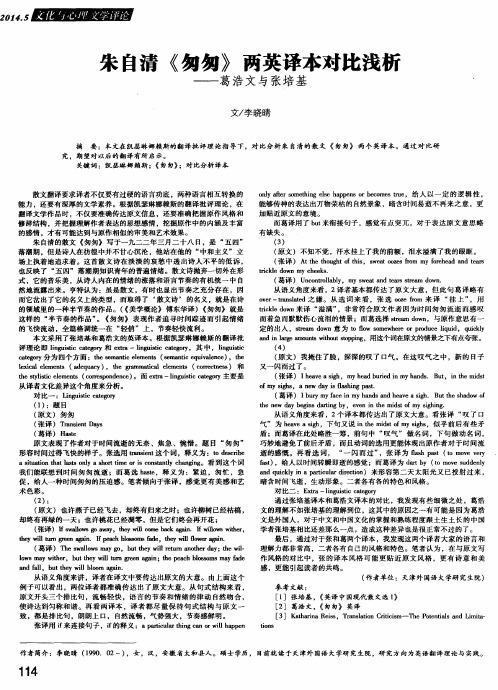
( 原文 )匆匆 ( 张译 )T r a n s i e n t D a y s ( 葛译 )H a s t e 原文表现 了作者对于时 间流逝 的无奈 、焦 急 、惋惜 。题 目 “ 匆 匆” 形容时 间过得 飞快 的样子 。张选用 t r a n s i e n t 这个词 ,释义为 :t o d e s c r i b e a s i t u a i t o n t h a t l a s t s o n l y a s h o r t t i me o r i s c o n s t a n t l y c h a n g i n g 。 看 到 这 个 词 我 们 能 联 想 到 时 间 匆 匆 流 逝 ;而 葛 选 h a s t e , 释 义 为 :紧 迫 , 匆 忙 , 急 促 ,给 人 一 种 时 间匆 匆 的压 迫 感 。 笔 者倾 向 于 张译 ,感 觉 更 有 美 感 和 艺 术 色彩 。
he t yw il lt u r n e e n a n .I fp e a c h b l o s s o ms f a d e ,t he ywi l lf l o we r a n .
( 葛译 )T h e s w a l l o w sm a y g o ,b u t he t yw i l l r e t u r n a n o he t r d y ;t a hew il —
2o1 比浅析
葛 浩文 与 张培 基
文/ 李 晓晴
摘 要 :本文在凯 瑟琳娜赖斯的翻译批 评理 论指导 下,对比分析 朱 自清的散 文 《 匆 匆》 两个英译 本。通过 对比研 究,期 望对以后 的翻译有所启 示。 关键词 :凯 瑟琳娜赖斯 ;《 匆匆》 ;对比分析译本
散文翻译要求译者不仅要有过硬 的语言功底 ,两种语 言相互转换 的 能力 ,还要有深厚的文学素养 。根据凯瑟琳娜赖斯 的翻译 批评理论 ,在
汉英语言对比论朱自清(匆匆)
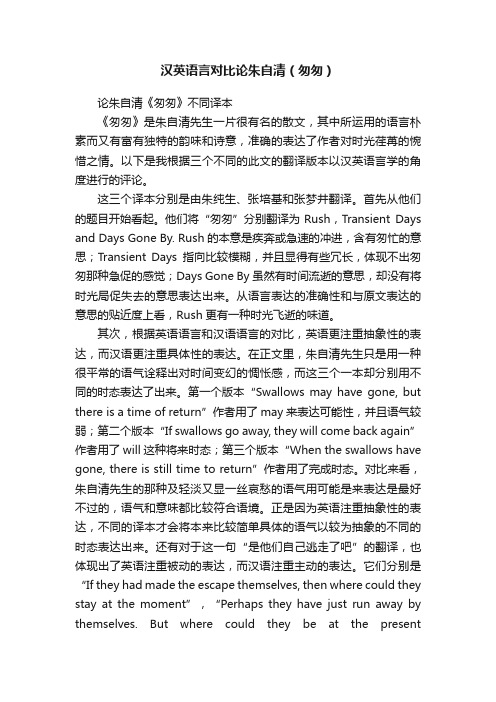
汉英语言对比论朱自清(匆匆)论朱自清《匆匆》不同译本《匆匆》是朱自清先生一片很有名的散文,其中所运用的语言朴素而又有富有独特的韵味和诗意,准确的表达了作者对时光荏苒的惋惜之情。
以下是我根据三个不同的此文的翻译版本以汉英语言学的角度进行的评论。
这三个译本分别是由朱纯生、张培基和张梦井翻译。
首先从他们的题目开始看起。
他们将“匆匆”分别翻译为Rush,Transient Days and Days Gone By. Rush的本意是疾奔或急速的冲进,含有匆忙的意思;Transient Days指向比较模糊,并且显得有些冗长,体现不出匆匆那种急促的感觉;Days Gone By虽然有时间流逝的意思,却没有将时光局促失去的意思表达出来。
从语言表达的准确性和与原文表达的意思的贴近度上看,Rush更有一种时光飞逝的味道。
其次,根据英语语言和汉语语言的对比,英语更注重抽象性的表达,而汉语更注重具体性的表达。
在正文里,朱自清先生只是用一种很平常的语气诠释出对时间变幻的惆怅感,而这三个一本却分别用不同的时态表达了出来。
第一个版本“Swallows may have gone, but there is a time of return”作者用了may来表达可能性,并且语气较弱;第二个版本“If swallows go away, they will come back again”作者用了will这种将来时态;第三个版本“When the swallows have gone, there is still time to return”作者用了完成时态。
对比来看,朱自清先生的那种及轻淡又显一丝哀愁的语气用可能是来表达是最好不过的,语气和意味都比较符合语境。
正是因为英语注重抽象性的表达,不同的译本才会将本来比较简单具体的语气以较为抽象的不同的时态表达出来。
还有对于这一句“是他们自己逃走了吧”的翻译,也体现出了英语注重被动的表达,而汉语注重主动的表达。
朱自清《匆匆》四个英文翻译

匆匆---朱自清The Flight of Time---Zhu Ziqing--- Tr. by 许景城(Peter Jingcheng Xu)PhD Candidate, School of English, College of Arts and Humanities, Bangor University, LL572DG, UK燕子去了,有再来的时候;杨柳枯了,有再青的时候;桃花谢了,有再开的时候。
但是,聪明的,你告诉我,我们的日子为什么一去不复返呢?——是有人偷了他们罢:那是谁?又藏在何处呢?是他们自己逃走了罢:现在又到了哪里呢?Gone are swallows, but they may come back again; withered are willows, butthey may turn green again; fading away are peach blossoms, but they may floweragain. Now, you my sage would you please tell me, why should our days roll by,never to return? Are they stolen by someone? If so, who could it be, and wherecould he or she hide them? If they run away themselves, where are they now?我不知道他们给了我多少日子;但我的手确乎是渐渐空虚了。
在默默里算着,八千多日子已经从我手中溜去;像针尖上一滴水滴在大海里,我的日子滴在时间的流里,没有声音,也没有影子。
我不禁头涔涔而泪潸潸了。
I have no idea of how many days I am granted, but I could feel their weight in my handsbecomes less and less. In contemplation, I count, there are more than eight thousand dayshaving slipped away through my fingers. Like a drop of water falling off the point of aneedle down to the sea, my days are dripping into the stream of time, soundless, andtraceless. Aware of this, I feel sweats exuding from my forehead, and tears brimming in myeyes.去的尽管去了,来的尽管来着;去来的中间,又怎样地匆匆呢?早上我起来的时候,小屋里射进两三方斜斜的太阳。
关于朱自清《匆匆》的两种英语译文对比与分析
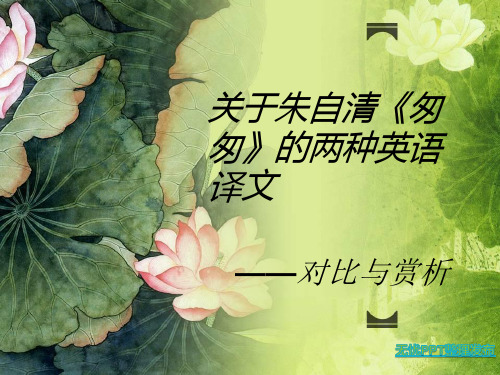
(1) 原文中虽有“但是”一词,但朱自清并非有表示转折
的意思,张培基此处直译,使得译文略逊一筹。
(2)leave一词有拟人的意义在里面,形容时间如人般离去,蕴含了 时间的惋惜和感叹之情,而go by表示单纯表示时间的流逝,单调乏 味,缺乏生动与美感。
四、是有人偷了他们吧:那是谁?又藏在何 处呢?是他们自己逃走了吧:现在又到了哪 里呢?
译文一:Now, you the wise, tell me, why should our days leave us, never to return? 译文二:But, tell me, you the wise, why should our days go by never to return?
两位作者采用了不同的用词,disappearing into,falling into两词中,disappearing into 更好的表现了间的来去匆 匆,消逝的不留痕迹。而张培基旳译文中,用了的falling into和后文的disappearing into也略显重复意味。
朱自清 《匆匆》的翻译对比

我不禁头涔涔而泪潸潸了。 我不禁头涔涔而泪潸潸了。 张译:At the thought of this, sweat oozes from my forehead 张译 and tears trickle down my cheeks. 朱译:Already sweat is starting on my forehead, and tears 朱译 welling up in my eyes. 朱选择了 start:to make a beginning on something, 只是一个简单 的开始的动作。张的ooze:come or flow out slowly.慢慢流出,更能 体现”涔涔”的那种动感美。朱的well up:flow or rise like water from a well (像泉水般流出、涌出),well up 用在此处似乎不合 适宜, trickle down:cause something to flow in a thin stream 使 成小股流动,更符合原文意境。
朱的oblonganyshapelongerthanwide牛津英汉双解词典由此可指它表示的方形一般是长方形之类的较规则形状但揣测原文意义应该是指像方形的块状物可能并不很规则据此张所用的squarishpatches似乎更能准确地表达洒在地上的阳光的形状
翻译根 子。这种情绪使我受到一点点表扬都会感 到难为情,使我怎么也说不出一个“不” 字。也是我不敢向父母多要一分钱。此外 ,这种缺乏信心的情况也影响了我对钢琴 的热爱
《匆匆》朱纯深、张培基英译文比较赏析
朱纯深、张培基先生都对朱自清的早期散文《匆匆》进行了翻译,两位大师在充分理解和 把握原文的基础上,运用娴熟的翻译技巧产出的译文各有特色。下面我们将对比分析两位译文 的部分精彩字句,学习其巧妙的翻译技巧,体会翻译中的高深学问。 燕子去了,有再来的时候;杨柳枯了,有再青的时候;桃花谢了, 有再开的时候。 朱译:Swallows may have gone, but there is a time of return; willow trees may have died back, but there is a time of regreening; peach blossoms may have fallen, but they will bloom again. 张译:If swallows go away, they will come back again. If willows wither, they will turn green If again. If peach blossoms fade, they will flower again. 原文开篇就是一个排比句,句子看似短小,实则翻译起来颇有难度。我们知道,英语是“重形 合”的语言,也就是说它强调句子间的逻辑关系,而汉语重“意合”,更注重传达句子意思而 句式较松散。因此,在翻译次句时,首先要考虑采用一个什么样的英文句式来衔接并体现原文 的逻辑关系。两种译文都采用了相同的句式,力求达到“形似”。朱的译文选择了”but”轻微转 折连词来衔接,且使用了”there is a time of “近于直译原文的句式,但最后一部分却改用”they will bloom again”, 使得整体句式稍未完整;而张培基则全部采用条件句”if” 衔接,既体现了句子 间的逻辑关系,又对应了原文的三个并列句,况且以”if”从句为首,还使人想起英国诗人雪莱的 名句If winter comes, can Spring be far away, 有助于烘托原文的韵味。
朱自清散文-匆匆 英汉对照
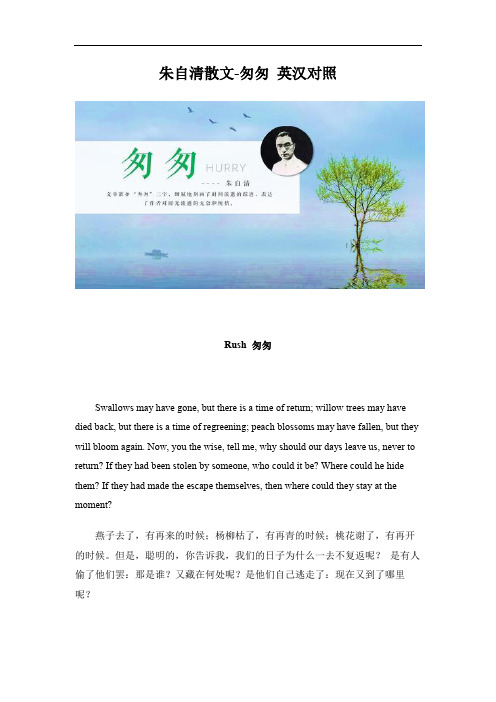
朱自清散文-匆匆英汉对照Rush 匆匆Swallows may have gone, but there is a time of return; willow trees may have died back, but there is a time of regreening; peach blossoms may have fallen, but they will bloom again. Now, you the wise, tell me, why should our days leave us, never to return? If they had been stolen by someone, who could it be? Where could he hide them? If they had made the escape themselves, then where could they stay at the moment?燕子去了,有再来的时候;杨柳枯了,有再青的时候;桃花谢了,有再开的时候。
但是,聪明的,你告诉我,我们的日子为什么一去不复返呢?是有人偷了他们罢:那是谁?又藏在何处呢?是他们自己逃走了:现在又到了哪里呢?I don''t know how many days I have been given to spend, but I do feel my hands are getting empty. Taking stock silently, I find that more than eight thousand days have already slid away from me. Like a drop of water from the point of a needle disappearing into the ocean, my days are dripping into the stream of time, soundless, traceless. Already sweat is starting on my forehead, and tears welling up in my eyes.我不知道他们给了我多少日子;但我的手确乎是渐渐空虚了。
对《匆匆》的三个译本对比分析

对《匆匆》的三个译本对比分析翻译大家常说好的翻译作品要忠于原文,完全了解原文的写作背景,作者的写作风格;并把握理解作者表达的思想感情,挖掘作者原作中的内涵,捕捉原作里的神韵之美,以及丰富的感情。
为了对比散文《匆匆》的三个不同译本我他特意查了一下《匆匆》的写作背景,然后读了几遍原文,深深地体味了一下朱自清的写作情感。
顿时,感受到了朱自清对时间流逝的无奈焦急和惋惜之情。
再读《匆匆》,似乎在听一首好听灵动的音乐,那朴素平淡的抒情气氛,优美的了律动美,委婉流畅悠远的的音律美油然而生。
然后再欣赏三个不同的译本,我或多或少感受到了三个译本各自不同的特点。
乍眼一看,我特别喜欢张培基先生的译本,我觉得他译的真好。
因为我看他的译文时,感受到了原作丰富的思想感情,浓厚的感染力,以及原文的美和意境。
但是经过仔细品味,我发现其实三个译本各有千秋,不能单单说谁译的好与不好,只能说谁翻译的比较准确,更能符合原文之美,原文之意,原文之味。
以下是我对三个译本的对比分析欣赏:(朱纯深,张培基,张梦井先生的译本)对比一:题目。
朱纯深译文:Rush张培基译文:Transient Days张梦井译文:Days Gone ByRush的意思是快速移动;急促;有仓促之意。
我认为时间虽然短暂,但也不至于仓促过往,rush 没有美感,也不符合原文所表达匆匆之意,不太妥帖。
Transien t的意思是转瞬即逝的,短暂的(continuing for only a short time )把时间匆匆流逝,时间短暂之意表达的淋漓尽致,似乎让人觉得时间犹如过往云烟,捉不住,摸不着,与原文匆匆之意相符合,且具有美感。
Go b y的意思是流逝,过去(to past)多指时间的推移,不能表达匆匆之意。
综上所述,Transient Days更为贴切,而其他两个就欠妥帖。
对比二:朱纯深:Swallows may have gone, but there is a time to return; willow trees may have died back, but there is a time of re-greening; peach blossoms may have fallen, but they will bloom again.张培基:If swallows go away, they will come back again. If willows wither, they will turn green again. If peach blossoms fade, they will flower again.张梦井:When the swallows have gone, there is still time to return; when the poplar and willow trees have become withered, there is still time to see green; when the peach flowers have already faded, there is still time to blossom.三人都运用排比句,句子结构类似,与原文形似,且读起来朗朗上口,自然流畅,气势强大,节奏感鲜明。
《匆匆》译本比较与评析
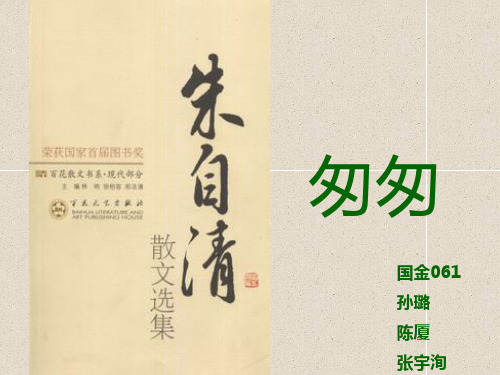
V2:But please tell me, genius, why then have my days gone and never returned?
Genius:天才,天资(usually great intelligence , skill 天才,天资 天才 or artistic ability )
匆匆
国金061 国金061 孙璐 陈厦 张宇洵
作者简介
朱自清,原名自华, 字佩弦,号秋实 生于光绪二十四年十 月初九( 1898年11月 22日),逝于1948年8 月12日 现代著名散文家,诗 人,学者,战士.原 籍浙江绍兴.
作品赏析
朱自清的散文诗 散文诗《匆匆》写于1922年3月 散文诗 28日.时是"五四"落潮期,现实不断给作者 以失望.但是诗人在彷徨中并不甘心沉沦,他 站在他的"中和主义"立场上执着地追求着. 全诗在淡淡的哀愁 淡淡的哀愁中透出诗人心灵不平 淡淡的哀愁 的低诉,这也反映了"五四"落潮期知识青年 的普遍情绪.
River
1.一个很正规的词,无比喻性,使翻译出来 的文章缺乏美感 2.指大事件的时间流
在逃去如飞的日子里,在千门万户的世界里 的我能做些什么呢? V1:Living in this world with its fleeting days and teeming millions, what can I do but waver and wander and live a transient life? Teeming:大量的,充满的 大量的, 大量的 (present in large numbers; full of people)
Fleeting& hurriedly Fleeting: 能够形象地表示出时间的短暂性,是 转瞬即逝的.就好像我们在说话的此刻,时间已 经一分一秒地过去,并且一去不复返.这是客观 的,使我们无法控制的. Hurry :则给人一种急急忙忙的感觉,有主观的 意味在其中,无法表达出时光悄然而逝的意味, 并且没有美感!
关于朱自清《匆匆》的两种英语译文对比与分析

相比之下,rush形容时间略带贬义,张培基的transient更符合时 间的特性,也符合作者表达时间匆匆溜走的原意。
二、燕子去了,有再来的时候;杨柳枯了, 有再青的时候;桃花谢了,有再开的时候。
译文一:Swallows may have gone, but there is a time of return; willow trees may have died back, but there is a time of regreening ; peach blossoms may have fallen, but they will bloom again. 译文二:If swallows go away, they will come back again. If willows wither, they will turn green again. If peach blossoms fade, they will flower again.
张译的wither只是单纯描绘树枯 ,而die back却让我们感受到生命在 轮回中的交替更新。
(2)朱纯深的译文句式表达很好,正好与汉语的句式相当,并且把句子的内在含 义表转折的意思表达出来。若将最后一句修改为和前句句式相同,这样译文就更 显工整。
三、但是,聪明的,你告诉我,我们的日子 为什么一去不复返呢?
七、像针尖上一滴水滴在大海里,我的 日子滴在时间的流里,没有声音,也没 有影子。
译文一:Like a drop of water from the point of a needle disappearing into the ocean, my days are dripping into the stream of time, soundless, traceless. 译文二:Like a drop of water falling off a needle point into the ocean, my days are quietly dripping into the stream of time without leaving a trace.
功能翻译理论视域下朱自清散文《匆匆》的译文比较赏析

功能翻译理论视域下朱自清散文《匆匆》的译文比较赏析朱自清的散文《匆匆》以心灵和生活的深刻形象,生动地描写了生活的无常和世事的不可知性,抒发出人对晚年生活的期待和恐惧,也流露出对美好生活的渴望。
本文将以《功能翻译理论视域下朱自清散文《匆匆》的译文比较赏析》为标题,比较分析不同译者对朱自清《匆匆》的译文,以期从功能翻译理论视角,赏析其中所饱含的翻译文体特点。
诞生于抗战年代的《匆匆》是当代著名作家朱自清的优秀作品之一,其语言简洁而深刻,表达出人们对生活无常和世事不可知性的深刻洞察,抒发出人对晚年生活的期待和恐惧,也流露出对美好生活的渴望。
朱自清的《匆匆》虽是散文,但其语句简洁有力,既包含文言文表达,又有现代文感染,使之自然而无卡顿,蕴含出一种悠久又充满活力的韵律感与美感,因而具有极强的译文不可分割性质。
朱自清《匆匆》译文的比较赏析应从当代功能翻译理论出发,依据翻译文体特点,将汉英双语译文分为准谱译文、参照译文、模仿译文三类,来观察其翻译风格和技巧,以求实现最佳翻译效果,从而深入剖析译文的表达意义。
首先,讨论准谱译文,准谱译文注重以有条理的“原文译文”结构,将“原文-翻译”间的衔接及相应词语、词义等细节进行翻译分析,以使译文与原文表达含义与形式相符,获得准确意义。
此类译文中,于谦认获得了不错的结果,其译文中在衔接上把握的基本上准确无误,初阶的表达也新颖活泼,并且有较强的原文特点:例如译文中的“轻轻弯腰,把缠绕的小灯笼背起来”,与原文的“把腰弯起来,背起缠着的灯笼”近乎完全相符,可谓与原文有着精致的把握。
其次,参照译文。
参照译文注重翻译技巧,基于受译语文化背景的变化,对源文有一定的借鉴和选择,以及充分运用表达形式,以达到更为灵活和准确的表达效果。
如徐家骏译文,从“锦夜一锣起”到“日落西山夕阳斜”等,其中就有许多自然的表达,以及潜移默化的语言,有效把握了原文的情调,同时又能更加地清晰地表达出诗句的意境,可谓是参照译文中的佳作。
朱自清《匆匆》 中英互译
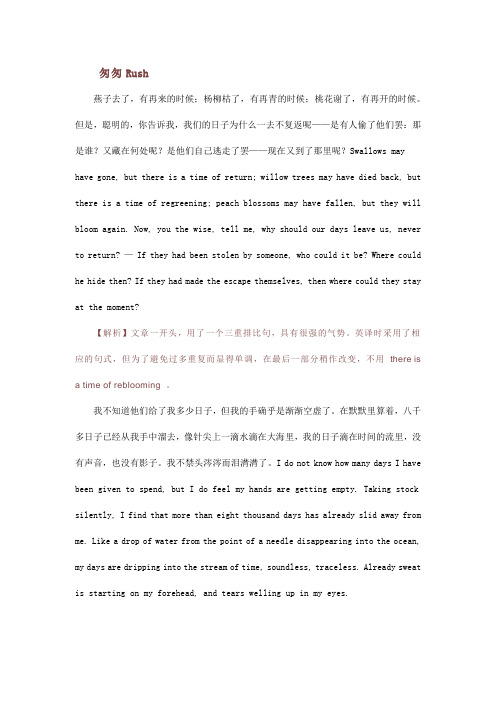
匆匆Rush燕子去了,有再来的时候;杨柳枯了,有再青的时候;桃花谢了,有再开的时候。
但是,聪明的,你告诉我,我们的日子为什么一去不复返呢——是有人偷了他们罢:那是谁?又藏在何处呢?是他们自己逃走了罢——现在又到了那里呢?Swallows may have gone, but there is a time of return; willow trees may have died back, but there is a time of regreening; peach blossoms may have fallen, but they will bloom again. Now, you the wise, tell me, why should our days leave us, never to return? — If they had been stolen by someone, who could it be? Where could he hide then? If they had made the escape themselves, then where could they stay at the moment?【解析】文章一开头,用了一个三重排比句,具有很强的气势。
英译时采用了相应的句式,但为了避免过多重复而显得单调,在最后一部分稍作改变,不用there is a time of reblooming 。
我不知道他们给了我多少日子,但我的手确乎是渐渐空虚了。
在默默里算着,八千多日子已经从我手中溜去,像针尖上一滴水滴在大海里,我的日子滴在时间的流里,没有声音,也没有影子。
我不禁头涔涔而泪潸潸了。
I do not know how many days I have been given to spend, but I do feel my hands are getting empty. Taking stock silently, I find that more than eight thousand days has already slid away from me. Like a drop of water from the point of a needle disappearing into the ocean, my days are dripping into the stream of time, soundless, traceless. Already sweat is starting on my forehead, and tears welling up in my eyes.【解析】在本世纪的白话文中,我们常常会发现第三人称代词的用法不甚规范。
朱自清《匆匆》四个英文翻译

匆匆---朱自清The Flight of Time---Zhu Ziqing--- Tr. by 许景城(Peter Jingcheng Xu)PhD Candidate, School of English, College of Arts and Humanities, Bangor University, LL572DG, UK燕子去了,有再来的时候;杨柳枯了,有再青的时候;桃花谢了,有再开的时候。
但是,聪明的,你告诉我,我们的日子为什么一去不复返呢?——是有人偷了他们罢:那是谁?又藏在何处呢?是他们自己逃走了罢:现在又到了哪里呢?Gone are swallows, but they may come back again; withered are willows, butthey may turn green again; fading away are peach blossoms, but they may floweragain. Now, you my sage would you please tell me, why should our days roll by,never to return? Are they stolen by someone? If so, who could it be, and wherecould he or she hide them? If they run away themselves, where are they now?我不知道他们给了我多少日子;但我的手确乎是渐渐空虚了。
在默默里算着,八千多日子已经从我手中溜去;像针尖上一滴水滴在大海里,我的日子滴在时间的流里,没有声音,也没有影子。
我不禁头涔涔而泪潸潸了。
I have no idea of how many days I am granted, but I could feel their weight in my handsbecomes less and less. In contemplation, I count, there are more than eight thousand dayshaving slipped away through my fingers. Like a drop of water falling off the point of aneedle down to the sea, my days are dripping into the stream of time, soundless, andtraceless. Aware of this, I feel sweats exuding from my forehead, and tears brimming in myeyes.去的尽管去了,来的尽管来着;去来的中间,又怎样地匆匆呢?早上我起来的时候,小屋里射进两三方斜斜的太阳。
- 1、下载文档前请自行甄别文档内容的完整性,平台不提供额外的编辑、内容补充、找答案等附加服务。
- 2、"仅部分预览"的文档,不可在线预览部分如存在完整性等问题,可反馈申请退款(可完整预览的文档不适用该条件!)。
- 3、如文档侵犯您的权益,请联系客服反馈,我们会尽快为您处理(人工客服工作时间:9:00-18:30)。
张译:Counting up silently, I find that more than 8,000 days have already slipped away through my fingers. 朱译:Taking stock silently, I find that more than eight thousand days have already slid away from me.
早上我起来的时候,小屋里射进两三方斜斜的太阳。 早上我起来的时候,小屋里射进两三方斜斜的太阳。
朱 译 When I get up in the morning, the slanting sun marks its presence in my small room in two or three oblongs. When I get up in the morning, the slanting sun casts two or three squarish patches of light into my small room.
我不知道他们给了我多少日子;但我的手确乎是渐渐空虚了。 我不知道他们给了我多少日子;但我的手确乎是渐渐空虚了。 张译:I don’t know how many days I am entitled to altogether, but 张译 my quota of them is undoubtedly wearing away. 朱译: 朱译 I don't know how many days I have been given to spend, but I do feel my hands are getting empty. 朱用了empty一词,其释义为 have nothing inside, 是一种状态。而 《匆匆》一文原作者更想表达的是一个流逝的过程而张选用 的”wear away” 一词来得非常自然、贴切。wear away 释义为 cause something to become thin, damaged, weak, etc. by constant use. 与原作者想要表达的他们给我的日子就这样渐渐流逝非常贴切。
很明显, 表现出译者求新求异的思维特征 大处着眼, 表现出译者求新求异的思维特征, 很明显,B表现出译者求新求异的思维特征,大处着眼,小 处着手的风度, 处着手的风度,还表现出了译者自如驾驭英汉各自优势的 能力。 能力。 我从小就对自己没信心,这是问题的根子” 这句, 似 “我从小就对自己没信心,这是问题的根子”,这句,A似 乎很完美,但当我们看B 的时候,就会觉得清风拂面, 乎很完美,但当我们看 的时候,就会觉得清风拂面,怎 么会想到enslave这个词呢 这个词呢? 么会想到 这个词呢 另外, 这种缺乏信心的情况也影响了我对钢琴的热爱” 另外,“这种缺乏信心的情况也影响了我对钢琴的热爱”一 句的英译, 句的英译,居然用上了 wormed its way into 如此生动的 短语!同样,在读A( 短语!同样,在读 (lack of confidence prevented me from learning piano),就会感慨那是守旧,求同的译文。 就会感慨那是守旧, 就会感慨那是守旧 求同的译文。
我不禁头涔涔而泪潸潸了。 我不禁头涔涔而泪潸潸了。 张译:At the thought of this, sweat oozes from my forehead 张译 and tears trickle down my cheeks. 朱译:Already sweat is starting on my forehead, and tears 朱译 welling up in my eyes. 朱选择了 start:to make a beginning on something, 只是一个简单 的开始的动作。张的ooze:come or flow out slowly.慢慢流出,更能 体现”涔涔”的那种动感美。朱的well up:flow or rise like water from a well (像泉水般流出、涌出),well up 用在此处似乎不合 适宜, trickle down:cause something to flow in a thin stream 使 成小股流动,更符合原文意境。
对于原文中的“去”字,朱译用leave,强调不在原位置;张译用go by, 强调的是时间过去的动作;张译中译者还有意用了O等字样以造成 一种古诗一般的情调,对全篇的“情绪”起到了“定格”的作用。可见译 者能以小译大,从小处着眼,传达出原文中深层次的美。
我不知道他们给了我多少日子
张译:I don't know how many days I am entitled to
在默默里算着,八千多日子已经从我手中溜去。两种
译文都能表达出原文意蕴,但细细品味,仍能发现各自的 优势与不足 在牛津词典中count up的准确意思是to calculate the total number of people,things,etc.in a particular group.而 take stock的意思是 to stop and think carefully about the way in which a particular situation is developing in order to decide what to do next.两都相比较,很 显然朱的译文是不太 恰当的。
At the root of it is my diffidence, by which i have been enslaved since childhood. It embarrasses me at the mildest flattery, crushed my utmost efforts to say . "no", and prevents me from asking my parents for one cent morn than necessary . Among other things, diffidence has wormed its way into my love of piano
altogether.
朱译:I don't know how many days I have been given to spend.
此处两位译者都使用了被动语态,对于核心词汇 “给”,张译entitle表达作者对生命的敬畏;而朱 译使用give这一泛指词汇,正是与汉语中“给”字 相对应,在此处也未尝不可。
《匆匆》朱纯深、张培基英译文比较赏析
朱纯深、张培基先生都对朱自清的早期散文《匆匆》进行了翻译,两位大师在充分理解和 把握原文的基础上,运用娴熟的翻译技巧产出的译文各有特色。下面我们将对比分析两位译文 的部分精彩字句,学习其巧妙的翻译技巧,体会翻译中的高深学问。 燕子去了,有再来的时候;杨柳枯了,有再青的时候;桃花谢了, 有再开的时候。 朱译:Swallows may have gone, but there is a time of return; willow trees may have died back, but there is a time of regreening; peach blossoms may have fallen, but they will bloom again. 张译:If swallows go away, they will come back again. If willows wither, they will turn green If again. If peach blossoms fade, they will flower again. 原文开篇就是一个排比句,句子看似短小,实则翻译起来颇有难度。我们知道,英语是“重形 合”的语言,也就是说它强调句子间的逻辑关系,而汉语重“意合”,更注重传达句子意思而 句式较松散。因此,在翻译次句时,首先要考虑采用一个什么样的英文句式来衔接并体现原文 的逻辑关系。两种译文都采用了相同的句式,力求达到“形似”。朱的译文选择了”but”轻微转 折连词来衔接,且使用了”there is a time of “近于直译原文的句式,但最后一部分却改用”they will bloom again”, 使得整体句式稍未完整;而张培基则全部采用条件句”if” 衔接,既体现了句子 间的逻辑关系,又对应了原文的三个并列句,况且以”if”从句为首,还使人想起英国诗人雪莱的 名句If winter comes, can Spring be far away, 有助于烘托原文的韵味。
翻译佳作 赏析
第一组
我从小就对自己没信心,这是问题的根 子。这种情绪使我受到一点点表扬都会感 到难为情,使我怎么也说不出一个“不” 字。也是我不敢向父母多要一分钱。此外 ,这种缺乏信心的情况也影响了我对钢琴 的热爱
A B
I was lack in confidence since childhood, which is the root of prolem. I would feel ashamed even when i was facing a bit praise. I found myself absolutely unable to say "no" , neither dared i ask for one cent more than necessary. Besides lack of confidence prevented me from learning piano.
张译:Counting up 再看slip away:to stop silently, I find that more existing; to disappear than 8,000 days have or die(消失,消亡,死 去).而slide away:to already slipped away move quickly and quietly, for example in through my fingers. order not to be noticed; 朱译:Taking stock to make sth move in silently, I find that more this way(快捷而悄声 than eight thousand 地移动).通过比较分析 days have already slid 不难看出slide away 更 能体现原文的美。在这 away from me. 一点上,朱的译文是相 当好的。
